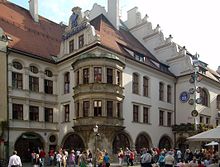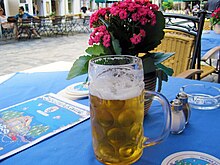48°08′15″N 11°34′47″E / 48.13750°N 11.57972°E
This article needs additional citations for verification. (March 2021) |




The Hofbräuhaus am Platzl is a beer hall in Munich, Bavaria, Germany, originally built in 1589 by Bavarian Duke Maximilian I as an extension of the Staatliches Hofbräuhaus in München brewery. The general public was admitted in 1828 by Ludwig I. The building was completely remodeled in 1897 by Max Littmann when the brewery moved to the suburbs. All of the rooms except the historic beer hall ("Schwemme") were destroyed in the World War II bombings. The reopening of the Festival Hall in 1958 marked the end of the post-war restoration work.
History
editWilliam V, Duke of Bavaria found the beer in Munich bad so he imported beer from Saxony.[citation needed] He eventually asked his royal court to find a solution. A local brewery followed in 1589.[citation needed]
On February 24, 1920, the Hofbräuhaus am Platzl is where Nazi Germany dictator Adolf Hitler made a speech founding the National Socialist German Workers' Party, or the Nazi Party.[1]
The Hofbräuhaus was largely destroyed from allied bombing raids during World War II,[2] but by Munich's 800th anniversary in 1958 the building had been faithfully reconstructed.[3]
Features
editThe restaurant comprises most of the Hofbräuhaus am Platzl, which also includes a ballroom and outdoor Wirtsgarten. Its menu features such traditional favorites of Bavarian cuisine as Brezn (soft pretzel), Obatzda (cheese dip), Hax'n, and sausages such as Bratwurst and Weisswurst. Brews include Helles and Dunkles served in a Maß, Weißbier, and wine.
Munich's largest tourist attraction after the Oktoberfest, the Hofbräuhaus am Platzl is also frequented by locals, many of whom keep their personal mugs ("Krüge") stored there.[4] During regular hours traditional Bavarian music is played. The famous Hofbräuhaus song (Hofbräuhaus-Lied), composed in 1935 by Wilhelm "Wiga" Gabriel, goes: "In München steht ein Hofbräuhaus, eine, zwei, g'suffa!" ("There's a Hofbräuhaus in Munich—one, two, down the hatch!" in the local dialect).[5]
Innkeepers
edit- 1885–1896: Martin Ammerloher
- 1897–1906: Joseph Wittmann
- 1906–1919: Karl Mittermüller
- 1919–1930: Hans Parzer (during Hyperinflation in the Weimar Republic)
- 1930–1945: Hans Bacherl (during Nazi rule in Germany and WWII)
- 1945–1950: Valentin Emmert (during Post-war)
- 1950–1960: Franz Trimborn (during completion of reconstruction)
- 1960–1970: Toni Steiner
- 1970–1980: Hans Glanegger[6]
- 1980–2004: Michael and Gerda Sperger[7]
- 2004–present: Wolfgang and Michael Sperger[8]
Famous patrons
editWolfgang Amadeus Mozart lived around the block from the beer hall in the late eighteenth century. In a poem he wrote, Mozart claimed to have written the opera Idomeneo after several visits to the Hofbräuhaus fortified him for the task.[citation needed] In the nineteenth century, most of the breweries in Munich, including the Hofbräuhaus, were converted into large beer halls, restaurants, and entertainment centers with large, cavernous meeting rooms for weddings, concerts, and plays. In the period just before World War One, Vladimir Lenin lived in Munich and reportedly visited the Hofbräuhaus on a regular basis.[9] In 1919, the Munich Communist government set up headquarters in the beer hall, and in February 1920 Adolf Hitler and the National Socialists held their first meeting in the Festsaal, the Festival Room, on the third floor.[citation needed]
On 24th February 1920, Hitler presented the Nazi Party's Twenty Five Point Program in the Hofbräuhaus.[1] On that day, the Nazi party held a large public meeting and whilst Hitler was speaking, the meeting erupted into a melee. There was a massive fight between the Social Democrat and Communist opponents of the Nazi party, and the anti-fascists eventually won the melee. Hitler managed to finish his address, notwithstanding the chaos of smashed tables and chairs and hurled beer mugs all about him. On 4 November 1921 the Hofbräuhaus was also the birthplace of the later feared Nazi terrorist organization, the Sturmabteilungen, or SA.
After Munich's world-famous Oktoberfest (where the Hofbräu has one of the largest beer tents), the Hofbräuhaus am Platzl is Munich's most outstanding tourist attraction and historical monument. Other famous visitors include Marcel Duchamp, Thomas Wolfe,[10] Louis Armstrong, Mikhail Gorbachev, NASA astronauts, and past American Presidents John F. Kennedy and George H. W. Bush.[citation needed]
-
Hofbräuhaus watercolor painting by Adolf Hitler
-
Regular patrons store their mugs in small lockers
See also
editReferences
edit- ^ Jump up to: a b Gaab, Jeffery S. (2006). Munich: Hofbräuhaus & History : Beer, Culture, & Politics. Peter Lang Inc., International Academic Publishers. p. 63. ISBN 978-0820486062.
- ^ Gaab, Jeffery S. (2006). Munich: Hofbräuhaus & History : Beer, Culture, & Politics. Peter Lang Inc., International Academic Publishers. p. 83. ISBN 978-0820486062.
- ^ Gaab, Jeffery S. (2006). Munich: Hofbräuhaus & History : Beer, Culture, & Politics. Peter Lang Inc., International Academic Publishers. p. 96. ISBN 978-0820486062.
- ^ This was introduced in 1972, when many of the clients did not want to exchange their "Keferloher" grey ceramic mugs for ordinary glass ones. There are 616 Krug-safes. https://www.sueddeutsche.de/muenchen/muenchen-hofbraeuhaus-masskrug-tresor-tradition-stammgast-stammtisch-1.4607381
- ^ www.hofbraeuhaus.de (in German) Die Geschichte des Hofbräuhauses > Historie > 1935. Retrieved 29 July 2013
- ^ www.hofbraeuhaus.de (in German) Die Wirte des Hofbräuhauses. Retrieved 29 July 2013
- ^ Paul Brandt: Das Münchner Hofbräuhaus. Dachau: Bayerland, 1997, ISBN 3-89251-232-9
- ^ "Wirtsfamilie Sperger in der zweiten Generation". www.hofbraeuhaus.de. Archived from the original on 27 June 2017. Retrieved 22 May 2011.
- ^ "Lenin loved beer! But he was never seen drunk". 18 March 2023.
- ^ Jeffrey Gaab, Munich: Hofbräuhaus and History (Peter Lang Publishers, NY, 2006)
External links
edit- Official Website Archived 28 April 2017 at the Wayback Machine
- Old Town City Panorama—Panoramic view at the Hofbräuhaus am Platzl
- Virtual Tourist articles
